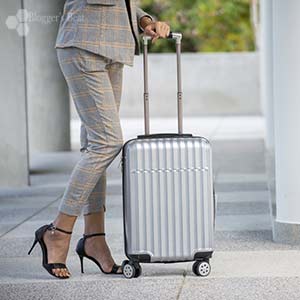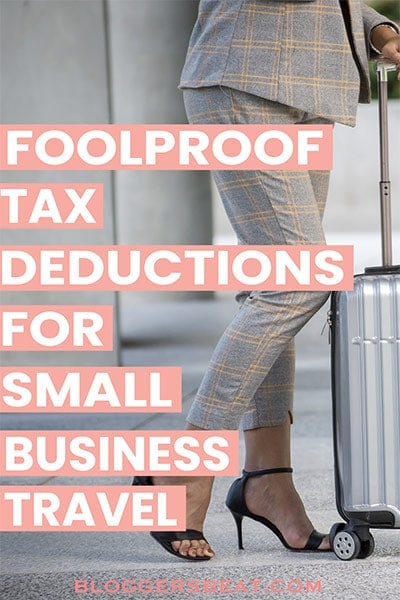For most small business owners, traveling for business purposes is a normal occurrence. But, when that first event arises, you may be left wondering how to document your travel expenses. Even more, you may not know exactly which small business travel expenses are tax-deductible.
Heads up, folks! The information provided here is based on my own professional experiences. While I do my own accounting, I am not YOUR accountant. I hope this post helps you or sheds light on the topic, but please be sure to check with your own accountant.
What Counts as Business Travel?

So, how do you determine if your trip qualifies as a business trip in the eyes of the IRS? First of all, the trip must be primarily for the purpose of your business.
If the primary reason for the trip is of a personal nature, and you just happen to do a bit of work on the side, it would not qualify as a business trip.
Secondly, a business trip must require rest or sleep.
Requiring rest or sleep means that you need to seek lodging due to the distance away from the tax home or and/or due to the length of time required to complete the tasks.
If you can reasonably do the work and return back to your tax home within a normal days work schedule, it most likely is not a business trip
And finally, the trips must be outside of your tax home.
Where is Your Tax Home?
Your tax home is the general area of your primary work location. This could be the company office, a home office, or some other location as long as it is the plan where the majority of your work is done.
Example 1: If you travel to a trade show in the next county and spend the day learning about new products for your business, it is reasonable to think that you would be able to return back to your tax home at the end of the day. This is not a business trip.
Example 2: If you travel to a trade show in a different state and end the evening by checking into a hotel, this would count as a business trip.
What Qualifies as a Tax Deductible Business Travel Expense?
According to the IRS, a business expense must be either necessary or common for your particular type of business. That can seem a bit ambiguous, but if you just apply rational thinking it isn’t too difficult to figure out most things.
For example: If you are a real estate agent and you attend a fashion show while on your trip, this most likely is not tax-deductible as a business expense.
However, if you are a fashion blogger and you attend that same show, it could be considered both necessary and common for your business. In which case, you would get the deduction.
How to Document Business Travel Expenses:
Save. Save. Save those receipts. If you are in doubt, hold onto it just in case.
Paper Documentation
A good idea is to carry a manilla envelope with you every time you set out on a new trip. These are great because they can catch all of those small receipts that have a tendency to get lost.
Write the location and details on the envelope because you will likely forget those later. Then, stuff every receipt that you get into that envelope.
If you pay cash for something, jot the details down on a post-it note or a petty cash slip and shove it in there.
This will keep all of your travel receipts separated by dates and events. You can always sort and organize them into permanent files later.
Digital Documentation
If you are a fan of digital documentation, there are a lot of apps available that will allow you to snap a photo of your receipts and save it digitally.
The IRS makes no preference in your system of recordkeeping other than to say that your digital records must contain the same details required for physical records.
However, you need to keep everything for at least seven years regardless of your system.
Types of Documentation that Qualifies as Proof:
According to the IRS, the types of documentation that support expenditures must show the date, the amount paid, and also show some sort of description to identify what the charges are for and to whom the money was remitted.
In other words, make sure that it can be discerned who was paid and for what. It is best to always get itemized charges on lodging and any other invoices where possible.
Some of the acceptable forms of documentation include:
- canceled checks in conjunction with other documentation that substantiate the details
- credit card statements (as long as the description is clear)
- invoices
- cash register receipts
- other account statements
- cash slips (only for small petty cash payments)
All of the above should contain the required information as laid out by the IRS.
Frequently Asked Questions About Business Travel Expense Deductions
Can I Deduct Hotel Charges?
Yes, the IRS allows loving costs to be deducted as a travel expense as long as the purpose qualifies as a business trip. This includes stays at hotels, motels, B&Bs and other overnight lodgings.
Can I Deduct My Hotel Cost if I Use Points or Other Free Stays?
In most situations, the answer is no. If you get a free stay for any reason, you can only deduct the portion of the stay that you pay for.
In fact, some free stays may actually be considered as income – such as free stays being offered in exchange for services.
It may be best to save your points for personal trips and check to see if your other free stays count as bartered transactions.
Can I Deduct Airline Fees?
Yes. As long as the purpose of the trip is for business, you may deduct the cost of your ticket.
Can I Deduct Auto Mileage?
Yes, although this isn’t necessarily counted as a travel expense. When using your own automobile to travel outside of your tax home, you should still document your expenses for this category as a transportation expense.
You should use the method that you use for all of your transportation expenses, either tracking mileage or actual costs.
Can I Deduct Cost of Meals?
The IRS allows you to deduct just 50% of the cost for meals. They assume that you would need to eat that meal whether or not you were on a trip. So, they no longer allow the full amount to be deducted. However, they still allow half of the cost to be deducted to offset those costs.
To be deductible, it can not be extravagant or lavish and you can only claim half of the amount that you pay for yourself. If part of your meal is recompensed by an employer, you can only claim 50% of the remaining amount.
Can I Deduct Tips?
Yes, as long as the tips are in relation to one of the other acceptable types of business travel expenses – tipping for hotel service, cabs, meals, etc.
Tips should be reasonable and documented. If a receipt is not available, use a cash slip to record the transaction. Keep in mind that amounts beyond the norm may throw a red flag.
Can I Deduct Taxi Uber and Shuttle Services?
Yes, if the purpose is for business-related transportation. You may need an Uber to get to a business meal or between the airport and the hotel.
However, transportation to an unrelated business event would not be deductible.
Can I Deduct Entertainment Expenses?
No. Entertainment expenses are no longer tax-deductible unless they are necessary or common for your business.
Can I Deduct Incidentals?
Incidentals such as fax machine charges, computer use, and other activities that are business-related are tax-deductible.
What about Baggage and Shipping Fees?
Occasionally, you may need to ship something to or from the location for business purposes. These are deductible. So, keep your receipts.
A good example would be the need to ship items from a conference. For instance, home decor bloggers who attend The Haven Conference each year end up with a lot of swag.
Because there is so much of it, they often can not carry it all back on their return flight. So, they box everything up and ship it back to themselves.
You may also need to ship something to a convention for a presentation. All are deductible because they are a necessary part of conducting business.
Can I Deduct Conventions or Trade Shows?
Speaking of conventions and trade shows, these are usually tax-deductible if they are common or necessary.
As already described, someone in the fashion industry would probably need to attend fashion shows.
Likewise, bloggers frequently attend blogging conferences related to their niche and businesses in retail and real estate frequently attend the ICSC (International Council of Shopping Centers) national convention in Las Vegas.
Can I Deduct Dry Cleaning and Laundry Services?
Yes. Dry cleaning and laundry service fees are tax-deductible. However, the purchase of clothes is typically not unless it is a uniform.
Can I Deduct Telephone Calls?
If you make telephone charges during your trip, these are usually tax-deductible within reason. Obviously, they need to be necessary. Calls to your psychic friend would not fall into that category.
Can I Deduct Expenses for a Travel Companion?
It really depends. If the travel companion is an employee or is traveling with you for business purposes, you can deduct the cost that you incur within the previous categories.
If, however, you are taking your spouse, friend, or partner along for personal reasons, you will need to separate the charges out. Only the business portion is tax-deductible.
Final Comments
Even though the IRS has given definite types of available tax deductions for business travel expenses, the area of what is necessary and/or common is a bit open-ended.
Use your best judgment and seek professional advice for items that are questionable or confusing.
For a complete explanation of business travel expenses, you can read Publication 463 on the IRS site.





Please keep it clean. Comments that do not follow the Comments Policy may be removed.